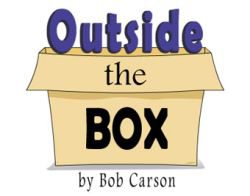The Wasteland
March 16, 2020,Editor’s Note: The USTA website is pleased to present freelance writer Bob Carson and his popular “Outside the Box” features. This monthly series is a menu of outlandish proposals presented with a wink — but the purpose behind them is serious. The views contained in this column are that of the author alone, and do not necessarily represent the opinions or views of the United States Trotting Association.
Our future is never a promise, and it arrives with shocking speed. The concept that the American sporting landscape would turn into a wasteland in a matter of a few days was unimaginable. But it happened. The void occurred with astonishing speed.
Like dominos, they fell — professional basketball, college basketball, hockey, soccer, and golf. Then, to many of us, the most troubling of them all, baseball. The country’s traditional national pastime would fall silent under the curse of the coronavirus pandemic. As of this writing, horse racing is limping along. Ironically, horse racing is limping more severely than ever with the doping revelations. Mercifully, the indictments will be crowded off many front pages by more important news.
When these sports return is a guess, we can only hope for the best but prepare for the worst. The sporting future is certainly not as important as our health, but many of us believe that sports take the sting out of life’s trials and tribulations. In some ways, sports and the intrigue around the games unite and shield us. Right now, the future is murky.
 Everything seems so dreamlike; life feels so ephemeral. Our world has shifted. And while some may view sports as insignificant, for many of us, the sporting world is essential. The future appears so unpredictable in so many ways, but the future will come.
Everything seems so dreamlike; life feels so ephemeral. Our world has shifted. And while some may view sports as insignificant, for many of us, the sporting world is essential. The future appears so unpredictable in so many ways, but the future will come.
As Abraham Lincoln said, “The most reliable way to predict the future is to create it.”
The next month or so might be a strange moment in time where racing horses could get a head start. Horses can soothe souls, to help heal. If circumstances and the future allow horses to race when humans cannot, healing is possible.
Large crowds are one problem horse racing does not have. Quite simply, people in our grandstands are not necessary. Racing can continue, or resume, without fans in attendance. Trainers, grooms, and drivers do not need to be in physical contact with each other. They can easily keep the social distance the medical experts suggest. The work they do is somewhat isolated and, if need be, could be even more isolated. At this point, it does not appear the coronavirus gets transmitted to pets or horses. Let us pray this is so.
Horse racing may continue because of these and other factors. If racing does shut down like our sporting brethren, these factors may allow us to ramp up more quickly. A window of opportunity could open for our sport. For a few precious weeks, perhaps months, we could have the field to ourselves.
The amount of sports broadcasting and sports streaming is staggering. Americans love their sports with near-religious ferocity. It will be challenging for Americans, especially American males, to adjust to a world where they cannot talk about the expiring contract of an all-star shortstop, or if Tiger’s back will be strong enough for Augusta. No longer can they spend hours pouring over the brackets for March Madness. All of these topics will be replaced with, well, nothingness. The void of sports is going to eliminate ninety percent of male conversation. The sporting void will be depressing. There will be deep hunger for sports, any sports.
We are a sport. We can fill the void. We can fill the screens.
For harness racing, regular broadcasting via networks of all stripes has long been a forbidden fortress. Now, they may find it in their financial interests to lower the drawbridge and plug us into the void. Any and every gatekeeper in our sport should be knocking on fortress doors. This window, where we are one of the few live sporting options available, could open many doors.
Would networks be interested? An editor once told me he looked on his job as feeding the beast. He said some days you have plenty of red meat to toss out to his audience, other days, all he had was some gruel and exotic tidbits. Then he looked over his reading glasses and said, but every day the beast needs to be fed.
Our sport could be a tasty morsel in a barren wasteland.
The sporting networks will be scrambling to replace lost content. Each sporting network has hundreds of employees looking for a sport. We could step in and fill the breach. I could make a long list of my sports-addicted friends who never give harness racing a thought. However, if we are the only game in town, they will watch, they will learn, and even when the big boys are back in town, some will stay.

